September/October 2023
Dear Friends of PiAf,
I hope this exciting edition of the Princeton in Africa Fellows Flyer finds you in good health and hearty spirit. It has been about 3 months since our 2023-24 cohort set off for their fellowships, scattered across 10 different countries on the African continent. Since then, they have accumulated many discoveries that they will share with us in their flyers below. Hear from Eva Barasa (International Rescue Committee–Somalia), Emily Langlois (International Rescue Committee–Somalia), and Fenja Tramsen (International Livestock Research Institute) as they relay their notes from the field.
In addition to their field work for their host organizations, our Fellows also found time to travel and reconnect with their PiAf community. This October, our Fellows Fenja, Rachel, and Zoe met up at the first inaugural Wildlife Conference at Naivasha and made new connections with our Board member, Grace Penn (of Mpala) and Nelly Palmeris.
Princeton in Africa staff have also had a busy fall. Executive Director Damilola Akinyele attended several events during the UN General Assembly week in September, including the 70th annual Africa-America Institute Gala, where she caught up with PiAf friends and partners, including President of the Bristol Myers Squibb Foundation John Damonti, Ambassador Cameron Hume, Dr. Mogo Matshaba of BIPAI Botswana, Mike Mizwa of Baylor, and Emmanuel Blinn of Tech Care for All. In addition, Stephanie Leroy and Emma Claire Jones attended an event honoring the African Leadership Academy (ALA) in New York City, where they met ALA’s new CEO, Hatim Eltayeb, and caught up with PiAf Board Member and alumnus, Ettie Philitas (2009-10).
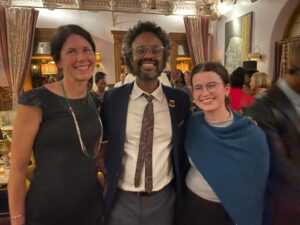
From left: Stephanie Leroy, ALA CEO Hatim Eltayeb, and Emma Claire Jones
The PiAf alumni community continues to be the backbone of our organization, providing professional support and grounded wisdom for the next generation of Fellows. In the past two months, we hosted two fantastic alumni-centered panels:
The Professional Sector Alumni Panel featured valuable industry insights from Neena Aggarwal (PiAf ‘18-19), Maya Gainer (PiAf ‘13-14), Dhruvi Joshi (PiAf ‘20-21), and Ìbílọlá Owóyẹlé (PiAf ‘17-18). Their advice spanned many innovative sectors, including international humanitarian aid & development, community health, and income generation.
The Black & African Alumni Panel featured Kwame Gayle (PiAf ‘13-14) and Ìbílọlá Owóyẹlé (PiAf ‘17-18) as they discussed their experiences navigating all the intersections of their identities while on the African continent and post-fellowship. The panel also featured video recordings from current Fellows Rachael Mutisya, Adam Hakizimana, and Idongesit Ikpang, who shared insight into their unique experiences as Fellows from PiAf’s first ever Nexus cohort.
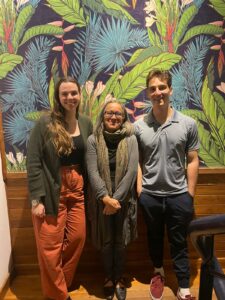
From left to right: Emily Langlois (’23-’24), Professor Lahra Smith of Georgetown University, and Max Kaye (’23-’24)
Serendipitous meet-ups are a hallmark of the PiAf experience! In October, two Nairobi-based Fellows who recently graduated from Georgetown University, Emily Langlois and Max Kaye, enjoyed dinner with Professor Laura Smith, Director of the African Studies Program at their alma mater. Back in the United States, alumni Kamila Radjabova (2020-21) and Agatha Offorjebe (2009-10) realized that they shared a PiAf connection during orientation for their Masters in Public Health program at Brown University.
In October, we welcomed a new Program Coordinator, Ngan Chiem, to our staff team. She is a graduate of Princeton University and has a passion in creative writing, mental health, and political science. Ngan’s bio can be found here.
We hope you enjoy this exciting edition of the Fellows Flyer! Look out for our newsletter in December, when we will share more stories from Fellows and the ever-growing PiAf family!
Warm regards,
The PiAf Team
PiAf Connections
Please click below to check out pictures of our Fellows, Alums and other members of the PiAf family meeting up at home and around Africa.
Notes from the Field
By Eva Barasa, '23-'24 Nexus Fellow with IRC Somalia
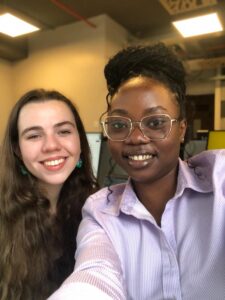
Nexus Fellow Eva Barasa (right) with her co-Fellow, Emily Langlois (left)
Eva Barasa is 2023-24 Nexus Fellow who is currently completing her fellowship at the International Rescue Committee’s Somalia office, where she works alongside general Fellow Emily Langlois. Eva and Emily’s co-Fellow relationship is a key part of Princeton in Africa’s Nexus Program.
I’m Eva Barasa, and I’m honored to be part of the 2023-2024 PiAf fellow cohort as a Nexus Fellow. My goals joining the program was to expand my scope of work and grow my skills to be a seasoned manager by exploring the operation of and working on a global scale while at the same time adding a larger element of impact within my role.
Currently, I am the Grants and Programs Coordinator at the Awards Management Unit (AMU) at the International Rescue Committee’s Somalia office, and the journey so far has been nothing short of transformative.
At IRC Somalia, the AMU is a dynamic force committed to precision. Our strategic planning and thoughtful program design leaves no room for error when it comes to implementation. This outstanding dedication to excellence is something I aim to leverage moving forward.
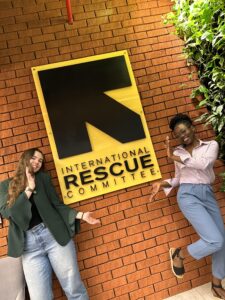
Within the AMU Somalia program, I collaborate with a talented team of six other individuals including my co-fellow Emily. My role encompasses a broad scope of responsibilities: grant management and reporting, business development, involvement in proposal crafting, and coordinating partnerships. The role demands versatility, creativity, and a strong sense of purpose. Within the first month I was fully integrated into my role and already collaborating on substantial institutional donor project design, participated in a new consortium project initiation and worked on donor reporting as well as created the team’s report tracking system to maintain on time compliance.
Looking ahead to the next year as I work towards my special project, I’m particularly drawn to exploring my interests in women’s protection and empowerment, economic development and recovery, and the water sanitation and health projects—areas that also align perfectly with IRCs core focus.
This opportunity is definitely an incredible journey of growth, impact, and transformation.
Notes from the Field
By Emily Langlois, '23-'24 Fellow with IRC Somalia
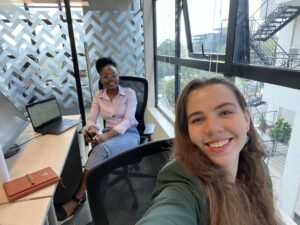
Emily Langlois (right) and Eva Barasa (left) at the IRC Somalia office in Nairobi, Kenya.
Emily Langlois is 2023-24 Fellow from PiAf’s general fellowship program who is currently completing her fellowship at the International Rescue Committee’s Somalia office, where she works alongside Nexus Fellow Eva Barasa. Emily and Eva’s co-Fellow relationship is a key part of Princeton in Africa’s Nexus Program.
When I found out I was going to be placed with the International Rescue Committee’s Somalia program based out of Nairobi, I was very excited to be heading back to my hometown but also learn more about a less familiar context. Upon arrival I met my Nexus co-fellow, Eva, and we quickly settled into a rhythm of work and life.
We spent the first couple of weeks in orientation. It has been lovely getting to know the small group of Nairobi-based staff and anyone who passes through the office. My day-to-day tasks involve grant proposal and report management, but my supervisors have been extremely welcoming of any personal interests that I’d like to pursue during my fellowship year. Through various meetings I’ve learned more about the humanitarian context in Somalia and new thinking in terms of responsible engagement and the development-humanitarian nexus.
I’ve taken some time to reflect about what it means for me to be in this role and what I can contribute to the organization and city to try and give as much as I receive. It’s a difficult question that I think every Fellow will face during their time, and ongoing conversations with my co-workers and other fellows have been valuable in the process.
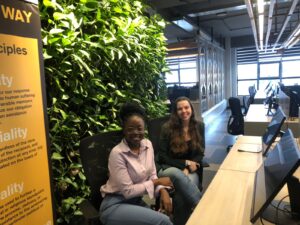 That said, it has been wonderful to have Eva to work alongside in this role. Eva and I share most of our responsibilities and come with different backgrounds and skill sets. It’s been useful to learn from one another and tough work assignments are less daunting knowing I can consult her. In the process I’ve also found a wonderful friend.
That said, it has been wonderful to have Eva to work alongside in this role. Eva and I share most of our responsibilities and come with different backgrounds and skill sets. It’s been useful to learn from one another and tough work assignments are less daunting knowing I can consult her. In the process I’ve also found a wonderful friend.I am excited to see what the next year has in store. On the side I’ve been looking into Kiswahili classes to sharpen my admittedly poor language skills and learning more about Nairobi. Pictured are me and Eva around the IRC Somalia office!
Notes from the Field
By Fenja Tramsen, '23-'24 Fellow with the International Livestock Research Institute
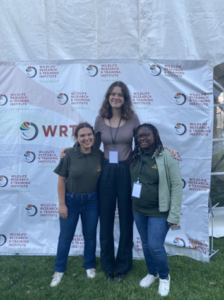
Left to right: Zoe Kaldor, Fenja Tramsen, and Rachael Mutisya at the Wildlife Scientific Conference
Hello! I’m Fenja and I have been working for the International Livestock Research Institute (ILRI) in the bustling city of Nairobi, Kenya for just under two months now!
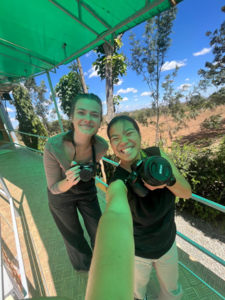
Fenja and Kristen photographing the Rabies vaccination event
Through my communications role at ILRI, I’ve been able to attend, report on, and help staff conferences like the Africa Climate Summit in Nairobi, and the Wildlife Scientific Conference in Naivasha. At the wildlife conference in Naivasha, I co-ran the ILRI booth and reported on an ILRI scientist’s presentation about zoonotic diseases (diseases spread between humans and animals).
I also got to meet up with my wonderful fellow PiAf Fellows, Rachael Mutisya and Zoe Kaldor (pictured here), who attended the conference with Mpala Research Centre, their host organization. After the conference, we also took the weekend to explore the beautiful Naivasha region. We hiked the dormant volcano Mount Longonot, biked the gorges in Hell’s Gate National Park, and took a boat across Lake Naivasha to see hippos and other wildlife!
Back in Nairobi, I’ve been busily trying to acquaint myself with the massive ILRI campus and its many staff members. I’ve been learning from veterinarians, biologists, and many other scientists to improve how I report and communicate their work which includes various diseases, and ‘one health’ initiatives, to name but a few.
Last week I attended one of ILRI’s Rabies vaccination events, pictured here with co-Fellow and co-event photographer, Kristen Tam!
I’m so excited to see where this year takes me!





















